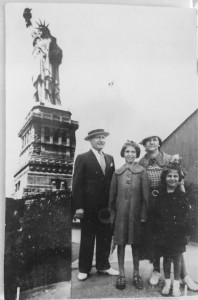“Right away we made plans to go to America,” my Grandpa told me. “Your Grandma and I, we met, we fell in love. We wanted to go join our brothers in New York.”
My grandparents, Markus Horowitz and Mania Alter, were born in Poland at the turn of the 20th century. Like many of their generation, they dreamt of immigrating to America, a land that offered more opportunity and less anti-Semitism.
When Mordche, as he was called, was drafted into the Polish army and forced to serve. There was no knowing when, or if, he would ever return. The family did what they had to do. They sent word that Mordche’s mother was deathly ill, and he was granted a brief leave to go see her.
“Mordche, over here!” Mania called in a hushed voice from the shadows of the street corner. Concealed in her boot, she had a forged passport and a packet of money.
“Take this. You go on, ahead.”
“Mania, I will send for you. We will marry in America.”
“Yah, yah, go! Get out of here!”
Mordche changed into civilian clothes, but the only shoes he had were his army boots. He was afraid, as he made his way to the port in Danzig, that someone would arrest him for deserting the army. He made it safely onto the first ship leaving for America. When he disembarked on May 30, 1921, he found himself in Boston, not New York. 
Apparently his forged passport passed muster. Of note on the arrival documents are “race: Hebrew,’ “anarchist: no,” and “purpose of trip: permanent.” No visa was required and nothing else deemed him legal or illegal.
Not speaking any English, Mordche somehow found his way to his brother in New York. Two years later he had saved enough money by selling dry goods to send for his sweetheart. Right away they changed their names to May and Moe, so that they wouldn’t look like greenhorns.
Their path to US citizenship was not difficult, although some of their family members encountered blocks after the quotas set by the 1924 Johnson-Reed Act, and some never made it to America. My grandparents spoke with accents and came from a different culture, but they embraced their new land and worked hard. They were proud to be American.
Passover teaches us to “love the stranger as yourself, for you were strangers in the land of Egypt.” As immigrants currently face threats of deportation and others are denied entry to the US, I reflect on this story of my grandparents’ journey. (see a video of Cindy telling this story)
What stories do you know about your family’s journey? What perspective might this lend to the experiences of others?
